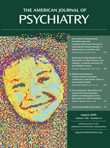Biased Public Health Perspective on Depression Treatment: Media Bias on Publication Bias
To the Editor: In their excellent commentary, Drs. Mathew and Charney (1) helped reorient us to a more balanced view of the acute efficacy of antidepressants over placebo. However, buried in their article and absent from most newspaper and other media accounts are the overwhelming data supporting continuation and prophylaxis. In 1993, John Davis, M.D., et al. (2) reported that the likelihood of the antidepressant preventive effect being a chance finding was astronomically low (p<0.10 –34 ). A recent meta-analysis conducted by Geddes et al. (3) indicated a 70% reduction in relapse with antidepressant continuation compared with placebo substitution.
The public gets a biased view from consideration of only the acute data indicating adverse health consequences. Additionally neglected in media coverage are depression data indicating that antidepressants 1) increase neuroprotective factors (such as brain-derived neurotrophic factor) and neurogenesis, 2) protect against hippocampal volume loss, and 3) prevent stress from decreasing brain-derived neurotrophic factor in the hippocampus (4) . Episodes of depression are overwhelmingly bad for peoples’ lives, cognition, brain function and structure, medical health, and longevity. The more depressions one has, the worse most of these adversities get.
Each depressive episode is associated with decreases in brain-derived neurotrophic factor (in proportion to its severity) and increases in oxidative stress, glucocorticoids, and inflammatory cytokines (4) . After every new depressive episode, there is an additional 10% risk of chronicity (failure to recover) (5) . All of the many treatment guidelines of which I am aware recommend long-term prophylaxis after two or three prior episodes of depression.
Why are these facts rarely in the news? The media are so anxious to conjure up conspiracies by the pharmaceutical industry that they fail in what used to be their primary mission: to inform the public. Further, rarely mentioned in articles about publication bias are its historical roots, i.e., the Food and Drug Administration requiring only two positive trials and ignoring the number of failed trials and the reluctance of journals to publish articles with negative results.
As clinicians and academicians, we need to better educate our patients and the public. Depression is markedly undertreated in both the short- and long-term, and it is a figurative and literal killer. Moreover, everyone should consider long-term antidepressant prophylaxis after several serious episodes, as suggested by the guidelines. The risks are small and the potential benefits are enormous.
1. Mathew SJ, Charney DS: Publication bias and the efficacy of antidepressants. Am J Psychiatry 2009; 166:140–145Google Scholar
2. Davis JM, Wang Z, Janicak PG: A quantitative analysis of clinical drug trials for the treatment of affective disorders. Psychopharmacol Bull 1993; 29:175–181Google Scholar
3. Geddes JR, Carney SM, Davies C, Furukawa TA, Kupfer DJ, Frank E, Goodwin GM: Relapse prevention with antidepressant drug treatment in depressive disorders: a systematic review. Lancet 2003; 361:653–661Google Scholar
4. Post RM: Role of BDNF in bipolar and unipolar disorder: clinical and theoretical implications. J Psychiatr Res 2007; 41:979–990Google Scholar
5. Keller MB, Lavori PW, Mueller TI, Endicott J, Coryell W, Hirschfeld RM, Shea T: Time to recovery, chronicity, and levels of psychopathology in major depression: a 5-year prospective follow-up of 431 subjects. Arch Gen Psychiatry 1992; 49:809–816Google Scholar



